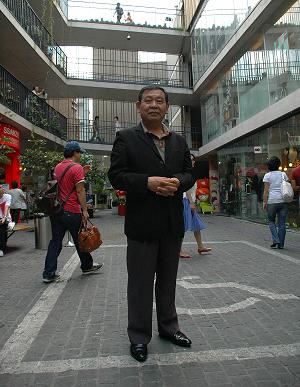A patron of Korean culture and the arts, Cheon Ho-seon
IF YOU have visited Insa-dong in the last few years, you must know Ssamiziegil, an iconic place of Insa-dong with its unique architectural design and shops. However, few people know that the CEO of Ssamziegil, Cheon Ho-seon (’61, Dept. of Phil.) is a Yonsei graduate. Even after retiring as a governmental official, he is still living a busy life based on his ten years’ experience of working in Canada, Denmark, and U.S.A as a cultural attaché, promoting Korean culture and arts.
Annals: How did Ssamziegil come into being?
The cultural policies of Korea are more focused on preserving and restoring culture, rather than changing and creating, due to the painful memory of being robbed of our cultural heritage by the Japanese during colonization. Believing that there is a need to become more future-oriented rather than being bound to the past, my brother and I came to select three strategic bases that could promote cultural development of Korea. Ssamziegil in Insa-dong is one of those bases established by my brother and me.
What is most memorable about your career life as a culture attaché?
When I was in New York, I made the acquaintance of Paik Nam-june, which continued even after I came back to Korea. I helped him to produce his video artwork, “Good Morning Mr. Orwell” broadcast by Korean Broadcasting System (KBS) in 1984. I dare say that this artistic event greatly shocked the Korean culture and stimulated its development.
What do you think is the charm of Korean culture?
The uniqueness of Korean culture can be found in its pottery. This is not only my own assumption, but is shared by other people as well. When the exhibition “Five Thousand Year of Korean Arts” was held, it was reported by the New York Times that the greatest difference of Korean art lies in pottery. Korean pottery is much simpler than decorative Japanese and Chinese ones but much more refined.
What was your life at Yonsei like?
When I attended Yonsei Univ., I was the president of the Alpine Club. I first introduced rock climbing to the club when members used to only go hiking. Although my club activities did not have a direct effect on my future career, rock climbing developed both my physical and mental endurance. I also spent a lot of time reading. Majoring in philosophy helped me to read more books.
Do you have any future business plans?
I founded Auction Byul, an auction house for art works, because I want Korea to become one of the countries that lead the international art movement. When I was the director of the fourth World Ceramic Exposition, I realized that the world is going to function like a single country in 20 or 30 years, especially in terms of culture and the arts. One of the main goals of Auction Byul is discovering and supporting new artistic talents that can win international recognition and raise Korean artistic standards.
Any last message to Yonseians?
During college life, I hope Yonseians have a chance to study futurology. This is not only important in reading the cultural and artistic trends of the world but also critical in finding out the changes in economic structures. Knowing how to read changes in the world is essential in order to realize a brighter future.
 | ||
| Cheon Ho-seon ('61, Dept. of Phil.) | ||
Kim Hee-jin
heejin212@yonsei.ac.kr

